
|
Agreeable Agreement: An Examination of the Quest for Consensus in Ecumenical Dialogue
Paperback / softback
Main Details
| Title |
Agreeable Agreement: An Examination of the Quest for Consensus in Ecumenical Dialogue
|
| Authors and Contributors |
By (author) Dr Minna Hietamaki
|
| Series | Ecclesiological Investigations |
|---|
| Physical Properties |
| Format:Paperback / softback | | Pages:272 | | Dimensions(mm): Height 234,Width 156 |
|
| Category/Genre | Christian theology
Theology |
|---|
| ISBN/Barcode |
9780567232595
|
| Classifications | Dewey:262.0011 |
|---|
| Audience | | Professional & Vocational | |
|---|
| Edition |
NIPPOD
|
|
Publishing Details |
| Publisher |
Bloomsbury Publishing PLC
|
| Imprint |
T.& T.Clark Ltd
|
| Publication Date |
20 October 2011 |
| Publication Country |
United Kingdom
|
Description
In recent bilateral ecumenical dialogue the aim of the dialogue has been to reach some form of doctrinal consensus. The three major chapters of the book discuss the variety of forms of doctrinal consensus found in ecumenical dialogues among Anglicans, Lutherans and Roman Catholics. In general, the dialogue documents argue for agreement/consensus based on commonality or compatibility. Each of the three dialogue processes has specific characteristics and formulates its argument in a unique way. The Lutheran-Roman Catholic dialogue has a particular interest in hermeneutical questions and proposes various forms of "differentiated" or perspectival forms of consensus. The Anglican-Roman Catholic dialogue emphasises the correctness of interpretations. The documents consciously look towards a "common future", not the separated past.
Author Biography
Minna Hietamaki received her PhD from the University of Helsinki, Finland, where she currently teaches.
Reviews'Minna Hietamaki provides a solid analysis of the ecumenical dialogues between Anglicans, Catholics and Lutherans, connecting it with the ongoing critical discussion on the value of the so-called "consensus ecumenism". While most ecumenical theologians are strong either in theological theory or ecclesial practice, Hietamaki masters both fields. She defends consensus ecumenism but considers that the arguments of its critics should be taken very seriously. Her work deserves, therefore, to be read by all parties involved in current ecumenism and systematic theology.' - Risto Saarinen, University of Helsinki, Finland -- Risto Saarinen 'In her remarkable first book, Faith and Order Commissioner Dr Minna Hietamaki poses serious yet timely challenges to the churches and their theologians engaged in ecumenical dialogue. By her analysis of the current (and at times uncritical) uses of the word "consensus" and associated terms such as agreement, convergence, consonance, and the (con)sensus fidelium, Dr Hietamaki offers profound yet realistic insights into the nature and purpose ecumenical dialogue and consensus ecumenism. As such, I consider her book to be a "prequel" to recent work on Ecumenical Reception. Her insights into the tripartite dialogues between Lutherans, Anglicans, and Roman Catholics are applicable to any bilateral dialogue, as well as to multilateral forum of Faith and Order.' - John Gibaut, Director of Faith and Order, World Council of Churches, Geneva, Switzerland -- John Gibaut 'In her very informative and challenging study, Hietamaki brings together for the first time on the one hand a thorough analysis of three long-time bilateral dialogues asking how they understand "consensus" or "agreement" and how they attempt to achieve them, and, on the other hand, an analysis of theoretical reflections on "consensus" in contemporary philosophy and theology. Thus she is able to raise important questions in a fresh way, to identify weaknesses and strengths, conceptual and methodological shortcomings or achievements in particular approaches. Ecumenical theology and work should take this study seriously, even if one does not agree with all of its findings.' - Theodor Dieter, Institute for Ecumenical Research, Strasbourg, France -- Theodor Dieter
|